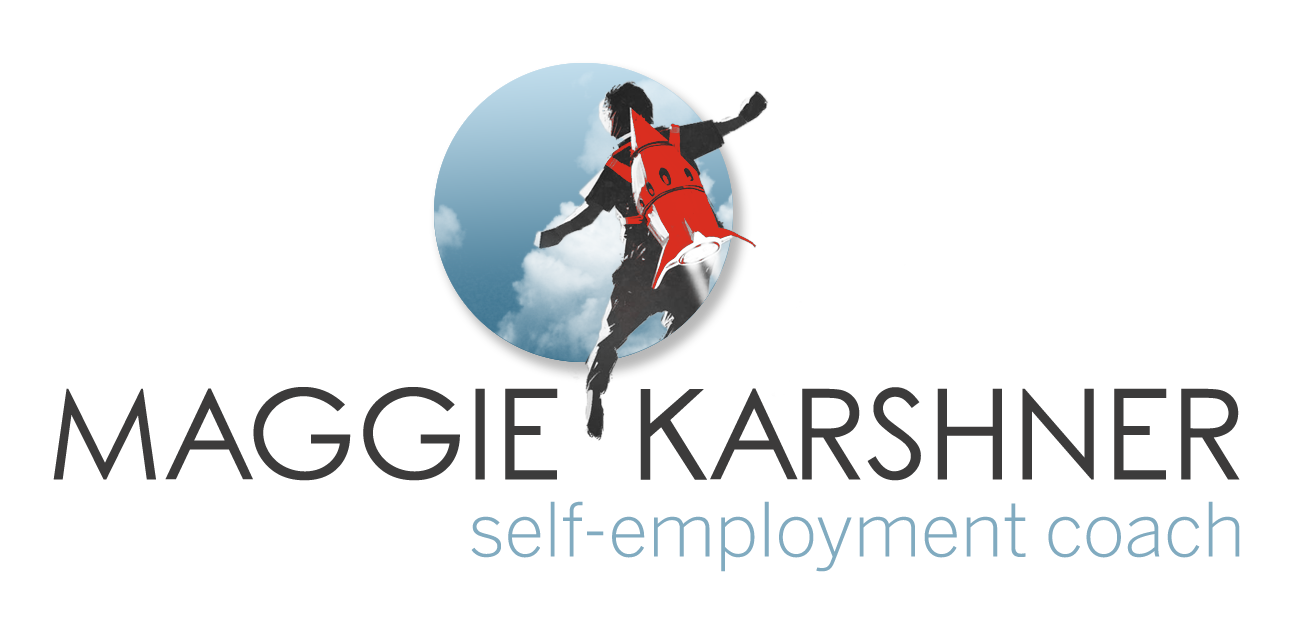Don't Let Rejection Plunge you into Despair! How to Prevail with Resilience!
/The most immense and universal hurdle of running a self-employed business is rejection. There's the immediate rejection of a client deciding not to work with you. There's also the larger-scale rejection by "the market" if your business should fail*. (*I detest the word "fail". It's a gross oversimplification that comes loaded with shame.) But one failed deal does not make for a failed business. How can we become more resilient at the small rejections, stick with it, and make the business as a whole a success? A business will be more successful if we can navigate rejection in a resilient way. And we'll have a nicer experience of the business too!
Let me start with a real-life example of a harsh rejection. I had a potential client reach out via phone and leave me a voicemail. The content of that message left me wondering if we were a good fit. I left him a voicemail clarifying what I do. I added that if he wanted more like what it sounded like he wanted, then we were not a very good fit.
He replied in a very long text message. In the message, he wondered aloud about how my industry (business coaching) even existed. His logic was that he'd run three businesses and didn't know how anyone could have advised him on those very specific, unique enterprises. It wasn't an aggressive message, but it was cutting and unnecessary. It's the kind of thing that can easily undermine one's confidence. Luckily for me, this came when I was already well-established. Had I not been, this kind of message might have shaken my confidence and had me re-evaluating many areas of my business.
Let's unpack this rejection through a lens I learned from Daniel Pink's book "Selling is Human". In that book, Pink talks about one's explanatory style, e.g. how we explain negative events. This self-talk could frame a rejection as permanent, pervasive, or personal. This framing allows the impact of that rejection to stick around or even escalate. More successful self-talk frames rejection as temporary, specific, or external. This framing lets us move on from rejection and put our energy into more productive tasks. The goal of this reframing isn't to ignore the feedback. Rather, we're aiming to give it an appropriate amount of weight (which is less than you might think.)
It's difficult to be aware of your explanatory style, much less understand what style you're using in any particular instance. We can use my example as a learning tool. I'll illustrate how this situation could be understood in three successful and unsuccessful ways.
Pervasive vs. Specific
My would-be client framed his thought as one that was consistent with my whole industry as if this was a pervasive systemic problem. Though really he was speaking from a singular point of view. He had no place to make sweeping assumptions about many people and situations.
It would be easy for the recipient of this feedback to think that this opinion is held by more than just this one individual. We humans are pattern recognition machines. It's natural to want to protect yourself from bad patterns at every turn. Especially in risky endeavors like starting a business. So on some level, it's reasonable to think this is the tip of some iceberg you need to avoid post haste.
This is where our higher-level brain functions come in. Is this feedback pervasive, or is it merely specific to this one individual? For this one data point do you have a counter data point? If you've had a client already, then you've met someone who thinks your work is helpful. If you've worked with more than one client, then your data set skews against this feedback. If you have yet to work with any clients, then do you have trusted friends who think your idea is as good as you do? Remember all the perspectives that don't align with this one very specific individual.
Permanent vs. Temporary
It's easy to feel like the way things are now is how they'll always be. This man's opinion sounds immutable. And my reaction when reading his message for the first time felt like the only possible reaction.
I can say with confidence the latter is not true. This exchange actually happened three years before the writing of this article. I've reread the message now and it struck me very differently than the notes I made at the time. I wonder if his opinion has changed over time, too.
When we're faced with rejection we can remind ourselves of the temporariness of what might feel very permanent. Even if the person doing the rejection doesn't change their position, our experience of it will change over time. The next person will likely not reject us. And even if they do, our experience of rejection is bound to change and evolve with each passing instance of it. This journey is moldable and ever-evolving. You get to shape it.
Personal vs. External
This is the penultimate question: does it have to do with you, or is this the other person's sh!t? My would-be client phrased things as "your industry" and "what you're pitching." This makes it sound less like a critique of the market and more directed toward me. It's as if I personally was doing something wrong, or had misconceived my business.
He made it sound like this was a me-problem. But whenever someone makes something about not-them, they've stepped outside their power. No one can force another to change. In fact, even when laying down boundaries, those invite (not require) others to change. The other person still has a choice. And we stay in our power by, if the boundary is crossed, creating the space necessary to maintain our boundary. A boundary does not require that they comply.
His step outside his power screams that this is not a me-problem, but a him-problem. I wonder if some hurt part of his subconscious had desperately desired advice and support in his prior business ventures. But instead of seeking that out, he squashed down those feelings and suffered through. This would be a reasonable story for how he came to be so baffled by an entire industry.
The thing to practice here is the line between your stuff and their stuff. And either way, you get to choose what to do with the information they've provided. You don't have to change your stuff. You don't have to help them deal with their stuff. It might not even warrant a response from you at all!
Building Resilience to Rejection
Rejection is never a fun thing to experience. With practice, we can make this experience less foundation-shaking. The next time you're experiencing rejection, ask yourself:
How is the rejection not permanent, but temporary instead?
How is the rejection not pervasive, but specific instead?
How is the rejection not personal, but external instead?
Do you want to work on these things with other like-minded self-employed business owners? Then my group coaching program is perfect for you!
I've designed my groups to clear blocks and build mindset skills that will propel you forward! This isn't ordinary business training. The intimate small group experience allows me to tailor the material to your unique situation. (Even if the guy quoted in this article couldn't see it, lol!)
Being in a small group, you’re able to connect with others who are going through the same process as you. You’ll have immediate access to reflections from me and your peers alike, plus a sense of community.
You get the support you need to take tangible steps toward your self-employment goals. When you work with me, it’s like putting on a jetpack. Boost your way into self-employment with a clear path! Know exactly what steps to take next, and see your progress each week.
Click here to learn more about my group coaching, and book a call with me to get started.




